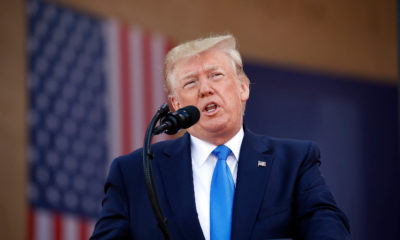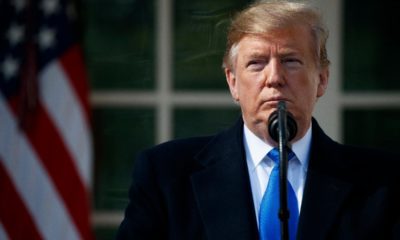World
Trump ‘declares’ war on media, to fight back ‘tooth and nail’
 Washington:The White House has launched an all-out war on the media, vowing to fight it “tooth and nail” after a row in which Donald Trump’s press secretary made allegedly false claims about the crowds at his inauguration, which were later defended as “alternative facts”.Press Secretary Sean Spicer on Monday is to hold his first daily press briefing at which he could face questions about his Saturday statement that included demonstrably false assertions about the crowd size at the inauguration and a promise by the new administration that “we’re going to hold the press accountable”.
Washington:The White House has launched an all-out war on the media, vowing to fight it “tooth and nail” after a row in which Donald Trump’s press secretary made allegedly false claims about the crowds at his inauguration, which were later defended as “alternative facts”.Press Secretary Sean Spicer on Monday is to hold his first daily press briefing at which he could face questions about his Saturday statement that included demonstrably false assertions about the crowd size at the inauguration and a promise by the new administration that “we’re going to hold the press accountable”.
Spicer made two unprovable statements in his briefing: that photographs of the audience at Trump’s inaugural were intentionally framed to minimize the appearance of support, and that Trump drew the largest audience ever to witness an inauguration.Spicer’s assertion that “this was the largest audience to ever witness an inauguration – period” was widely challenged in media reports citing crowd count experts and was lampooned on social media as well.
The Washington subway system said it had 193,000 riders by 11 am (1600 GMT) on Friday, compared with 513,000 at that time during the 2009 inauguration, reported His briefing followed Trump’s visit to the Central Intelligence Agency (CIA) headquarters, where he condemned the media over underestimating the number of people who attended his inauguration ceremony and said that he had a “running war” with the media, reported New York Times.Trump had called journalists as “the most dishonest human beings on Earth”.
President Trump’s chief of staff has accused the media of attempting to “delegitimize” Trump on his first days in office and vowed to “fight back” against slanted coverage.”I’m saying there is an obsession by the media to delegitimize this president, and we are not going to sit around and let it happen,” Reince Priebus said on Fox News Sunday.”We are going to fight back tooth and nail every day and twice on Sunday.”He said there was biased media coverage about the crowd size at the inauguration and the content of Trump’s address.
“He’s ready to get to work; however, the media from Day One has been talking about delegitimising the election, talking about the Russians, talking about everything you can imagine except for the fact that we need to move this country forward.””I’m saying there is an obsession by the media to delegitimise this President, and we are not going to sit around and let it happen,” Priebus said.”We are going to fight back tooth and nail every day and twice on Sunday.”
Tensions flared anew on Sunday when Kellyanne Conway, one of Trump’s top advisers, told CBC’s Chuck Todd on “Meet the Press” that Spicer had merely presented “alternative facts” about the inauguration. She also accused Todd of laughing at her and said he symbolizes how Trump has been treated by the media.Former CBS anchor Rather, who famously tangled with the Nixon White House during the Watergate era, said the situation saddened him.”I don’t think the American people as a whole, whether they supported Donald Trump or not, want a situation where the press secretary to the President comes out and knowingly tells a lie,” he said.
World
Lockdowns in China Force Urban Communities to Defy Censorship and Vent Frustration Online

Shanghai’s rich middle class is leading a wave of online dissent over the strict and prolonged lockdowns imposed in various parts of the country. Chinese internet censorship is struggling as patience is wearing thin in many urban centers, coming up with creative forms of online protests.
Social Media Posts Revealing Lockdown Tension in Shanghai
Drawn-out lockdowns are nothing new in China as authorities insist with the nation’s zero-Covid policy since the start of the pandemic. Currently over This time around, however, metropolitan areas like Shanghai are increasingly difficult to keep quiet, given that its more than 25 million residents have seen weeks of total isolation along with food shortages and many other service interruptions.
Dozens of towns and reportedly over 300 million Chinese citizens have been affected by lockdowns of different severity. As expected, urban netizens have been most outspoken over their difficulties by finding creative ways to get around state censorship and bans placed on topics, news comments and spontaneous campaigns.
Shanghai residents have been using mobile proxies and hijacking seemingly unrelated hashtags to talk about healthcare issues, delivery failures and the overall severity of their situation. The “positive energy” that the Chinese government wants to transmit during the recent prolonged series of lockdowns does not come naturally to those counting food supplies and online censors are working hard to filter words, trending topics and undesired social media sharing.
WeChat groups and message threads are under constant monitoring. Posts questioning the zero-Covid approach have been quickly deleted, including by leading Chinese health experts like Dr. Zhong Nanshan. Video footage is soon censored and protests and investigations are quickly made to disappear.
Where this has not worked, officials have exposed banners with warnings and outright threats like “watch your own mouth or face punishment”, while drones have been patrolling the city skies. Yet, if anything, this has led to further tensions and unspoken confrontation with Shanghai’s educated and affluent middle class.
Creative Online Solutions Harnessing Civic Energy
Announcements by Chinese social media that they would be publishing the IP addresses of users who “spread rumors” have not helped either. Tech industry research has shown that much of Asia’s tech-savvy population has a habit of using mobile proxies and other privacy tools, quickly finding workarounds to browse the internet freely and talk to the world about the hottest topics.
The sheer volume of forbidden posts is already a challenge for the very censorship system, experts explain. Unable to track all trending hashtags, state workers overlook topics that speak about the US, Ukraine or other popular news. Linking human rights elsewhere to their situation, Chinese online dissidents establish their informal channels and “hijack” the conversation to share personal or publicly relevant information about the Covid suppression in their town.
Sarcastic and satirical posts still dominate. Others hope to evade the censors by replacing words from famous poems or the national anthem. One thing is certain – social media, when harnessed with the right creativity, has proven its ability to mount pressure on the government in even some of the most strictly controlled tech environments like China.























